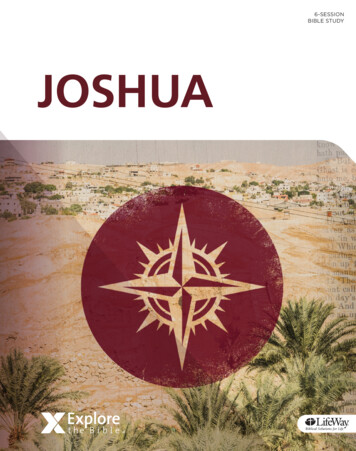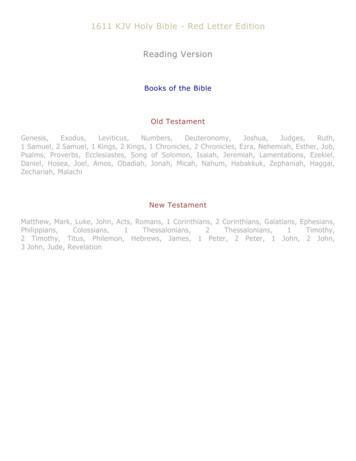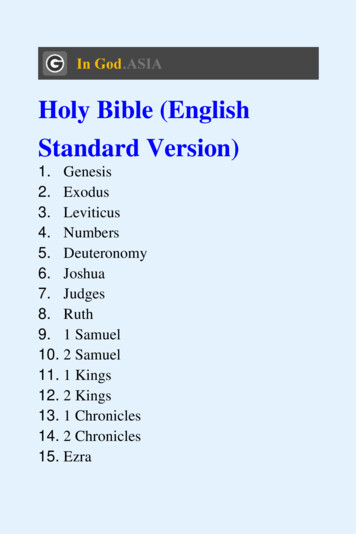
Transcription
Commentary onthe Books ofJoshua and RuthBible Study Notes and Commentsby David E. PratteAvailable in print atwww.gospelway.com/sales
Commentary on the Books of Joshua and Ruth:Bible Study Notes and CommentsRevised Edition Copyright David E. Pratte, 2010, 2013Minor revisions2016All rights reservedISBN-13: 978-1502710178ISBN-10: 150271017XNote carefully: No teaching in any of our materials isintended or should ever be construed to justify or to in anyway incite or encourage personal vengeance or physicalviolence against any person.Front Page PhotoThe ruins of ancient Jericho (public domain)“And the Lord said to Joshua, ‘See! I have given Jericho into yourhand ’” – Joshua 6:2“By faith the walls of Jericho fell down after they were encircled forseven days.” – Hebrews 11:30Other AcknowledgementsUnless otherwise indicated, Scripture quotations are generally from theNew King James Version (NKJV), copyright 1982, 1988 by Thomas Nelson,Inc. used by permission. All rights reserved.Scripture quotations marked (NASB) are from Holy Bible, NewAmerican Standard La Habra, CA: The Lockman Foundation, 1995.Scripture quotations marked (ESV) are from The Holy Bible, EnglishStandard Version, copyright 2001 by Crossway Bibles, a publishingministry of Good News Publishers. Used by permission. All rights reserved.Scripture quotations marked (MLV) are from Modern Literal Versionof The New Testament, Copyright 1999 by G. Allen Walker.Scripture quotations marked (RSV) are from the Revised StandardVersion of the Bible, copyright 1952 by the Division of Christian Education,National Council of the Churches of Christ in the United States of America.Scripture quotations marked (NIV) are from the New InternationalVersion of the Holy Bible, copyright 1978 by Zondervan Bible publishers,Grand Rapids, Michigan.Study Notes on JoshuaPage #2
Other Books by the AuthorTopical Bible StudiesGrowing a Godly Marriage & Raising Godly ChildrenWhy Believe in God, Jesus, and the Bible? (evidences)The God of the Bible (study of the Father, Son, and Holy Spirit)Grace, Faith, and Obedience: The Gospel or Calvinism?Kingdom of Christ: Future Millennium or Present Spiritual Reign?Do Not Sin Against the Child: Abortion, Unborn Life, & the BibleTrue Words of God: Bible Inspiration and PreservationCommentaries on Bible BooksGenesisJoshua and RuthJudges1 SamuelEzra, Nehemiah, and EstherJobProverbsGospel of MarkGospel of JohnActsRomansEphesiansPhilippians and ColossiansHebrews1 & 2 PeterBible Question Class BooksGenesisJoshua and RuthJudges1 SamuelEzra, Nehemiah, and EstherJobProverbsEcclesiastesIsaiahGospel of MatthewGospel of MarkGospel of LukeGospel of JohnActsRomans1 Corinthians2 Corinthians and GalatiansEphesians and PhilippiansColossians, 1&2 Thessalonians1 & 2 Timothy, Titus, PhilemonHebrewsGeneral Epistles (James – Jude)RevelationWorkbooks with Study NotesJesus Is Lord: Workbook on the Fundamentals of the Gospel of ChristFollowing Jesus: Workbook on DiscipleshipGod’s Eternal Purpose in Christ: Workbook on the Theme of the BibleVisit our website at www.gospelway.com/sales to see acurrent list of books in print.Page #3Study Notes on Joshua
Other Resources from the AuthorPrinted books, booklets, and tracts available atwww.gospelway.com/salesFree Bible study articles online atwww.gospelway.comFree Bible courses online atwww.biblestudylessons.comFree class books atwww.biblestudylessons.com/classbooksFree commentaries on Bible books atwww.gospelway.com/commentaryContact the author atwww.gospelway.com/commentsStudy Notes on JoshuaPage #4
Table of ContentsJoshua 1 . 13Joshua 2 . 19Joshua 3 . 25Joshua 4 . 29Joshua 5 . 33Joshua 6 . 40Joshua 7 . 45Joshua 8 . 52Joshua 9 . 57Joshua 10 . 62Joshua 11 . 69Joshua 12.74Joshua 13. 75Joshua 14. 78Joshua 15 . 80Joshua 16. 82Joshua 17 . 83Joshua 18 . 85Joshua 19. 87Joshua 20 . 89Joshua 21. 91Joshua 22 . 94Joshua 23 . 98Joshua 24 . 101Ruth Chapter 1 . 107Ruth Chapter 2 . 115Ruth Chapter 3 . 122Ruth Chapter 4 . 128(Due to printer reformatting, the above numbers may be off a fewpages.)Page #5Study Notes on Joshua
Notes to the ReaderTo save space and for other reasons, I have chosen not to includethe Bible text in these notes (please use your Bible to follow along).When I do quote a Scripture, I generally quote the New King JamesVersion, unless otherwise indicated. Often – especially when I do notuse quotations marks – I am not quoting any translation but simplyparaphrasing the passage in my own words. Also, when I ask thereader to refer to a map, please consult the maps at the back of yourBible or in a Bible dictionary.You can find study questions to accompany these notes atwww.gospelway.com/salesTo join our mailing list to be informed of new books orspecial sales, contact the author atwww.gospelway.com/commentsStudy Notes on JoshuaPage #6
Introductory Thoughts aboutCommentariesOnly the Scriptures provide an infallible, authoritatively inspiredrevelation of God’s will for man (2 Timothy 3:16,17). It follows thatthis commentary, like all commentaries, was written by anuninspired, fallible human. It is the author’s effort to share hisinsights about God’s word for the purpose of instructing and edifyingothers in the knowledge and wisdom found in Scripture. It is simplyanother form of teaching, like public preaching, Bible class teaching,etc., except in written form (like tracts, Bible class literature, etc.).Nehemiah 8:8; Ephesians 4:15,16; Romans 15:14; 1 Thessalonians5:11; Hebrews 3:12-14; 5:12-14; 10:23-25; Romans 10:17; Mark16:15,16; Acts 8:4; 2 Timothy 2:2,24-26; 4:2-4; 1 Peter 3:15.It follows that the student must read any commentary withdiscernment, realizing that any fallible teacher may err, whether heis teaching orally or in writing. So, the student must compare allspiritual teaching to the truth of God’s word (Acts 17:11). It may bewise to read several commentaries to consider alternative views ondifficult points. But it is especially important to consider the reasonsor evidence each author gives for his views, then compare them to theBible.For these reasons, the author urges the reader toalways consider my comments in light of Scripture.Accept what I say only if you find that it harmonizes withGod’s word. And please do not cite my writings asauthority, as though people should accept anything I sayas authoritative. Always let the Bible be your authority.“He who glories, let him glory in the Lord”– 1 Corinthians 1:31Page #7Study Notes on Joshua
Abbreviations Used in These NotesASV – American Standard Versionb/c/v – book, chapter, and verseESV – English Standard Versionf -– the following verseff – the following versesKJV – King James VersionNASB – New American Standard BibleNEB – New English BibleNIV – New International VersionNKJV – New King James VersionRSV – Revised Standard Versionv – versevv – versesStudy Notes on JoshuaPage #8
Introduction to JoshuaAuthorJoshua himself most likely wrote the historical record on whichthe book of Joshua is based (see 24:25-28). However, it is possiblethat some later inspired writer edited the account and added somematerial by inspiration of the Holy Spirit. Horne (see bibliography)discusses the possibilities at length.Period of Bible HistoryConquest of CanaanThemeGod enables Israel to inherit the promised land of Canaan.Main charactersJoshua, the IsraelitesBackground of Joshua’s life:* Led Israel in battle against Amalek (Exodus 17:9-14)* Served as Moses’ personal minister, accompanying him on Mt.Sinai (Exodus 24:13; 32:17; 33:11)* Expressed jealousy that others prophesied besides Moses(Numbers 11:28)* Sent into Canaan as one of 12 spies. Only he and Caleb saidIsrael could conquer Canaan, so only those two were allowed to enter(Numbers 13&14; 26:65; 32:12).* Appointed as Moses’ successor as leader of the nation(Numbers 27:15-23; Deuteronomy 31:7,8; 34:9).Notice that Joshua was trained to prepare him to take the placeof Moses as the leader of the people. This was done by experience andespecially by working with Moses to learn from him principles ofgood leadership. This is an important Biblical principle. God’s peopleneed to train those who can serve in leadership roles.In particular, people need to learn to serve by working with thosewho are more experienced. Jesus trained the apostles by taking themwith Him throughout His public ministry so they could learn fromHim how to be effective teachers. The apostle Paul always had othermen with him on his preaching trips, including young men such asTimothy and Mark. Likewise today, those who are older and morePage #9Study Notes on Joshua
experienced in teaching and leading among God’s people need totrain those who are younger or more experienced by taking themalong in their teaching work so they can learn by observing and thenby experience.“Joshua” (Hebrew) means Jehovah Savior and is equivalent toGreek “Jesus.” Just as Joshua provided salvation for the nation ofIsrael by leading them into the promised land of Canaan, so JesusChrist provides salvation for all mankind by offering us eternal life inthe promised land of heaven.Introductory notesNote the relationship between this book and God’s promise toAbraham.God had promised three major blessings to Abraham’sdescendants: 1) a great nation, 2) possession of Canaan, and 3) ablessing on all nations (salvation through Jesus) to come on allnations through His descendants -- Gen. 12:2,3,7; 15:5-8,18-21;13:15,17; 18:18; 22:17,18; 24:7; 26:3,4,24; 28:3,4; 32:12.Israel had become a great nation while in Egyptian captivity,fulfilling the first promise. By God’s mercy, Moses had led them outof Egypt and given them the law. He led them to Canaan the first timethey approached the land, but they refused to enter. God punishedthem by making them wander forty years in the wilderness. Mosesled them through that wandering; but because he himself latersinned, he was not allowed to enter the land.Moses led the people to capture the land east of Jordan, anddivided it between the tribes of Reuben, Gad, and half of Manasseh.He died in sight of the land west of Jordan, and Joshua was appointedto lead the people into the land.This book reveals the fulfillment of the second promise toAbraham – the land promise. Note 11:23; 21:43-45; 23:14. As such,Joshua is a symbol of Jesus, who leads us to the eternal promisedland (Heb. 4:5-16).Facts about the land of Canaan (see a map)The following is a summary of information from the Waldron’snotes:Canaan is bounded by the Mediterranean Sea on the west and onthe east the Jordan River, the Sea of Galilee, and the Dead Sea(although the 2½ tribes did inherit territory east of Jordan). Fromnorth to south it stretches from mountainous regions north of the Seaof Galilee to the desert area south of the Dead Sea.Dan was generally considered the northernmost city andBeersheeba the southernmost, a distance of 150 miles between them.Study Notes on JoshuaPage #10
East to west the area is about 30 miles across in the north and 55miles in the south. The whole territory is smaller than almost everyindividual state of the USA.When Israel inherited the land, it was very fertile and productiveas indicated by the fruit found there by the 12 spies. However, due tothe people’s unfaithfulness, God later brought curses on the land asHe had promised to do; as a result, today it is generally dry andunproductive.The main bodies of water are the Mediterranean Sea, the JordanRiver, the Sea of Galilee, and the Dead Sea.Near the Sea on the west is a coastal plain. This plain is the areaof Phoenicia north of Mt. Carmel. South of that mountain for a waysis the Plain of Sharon. The area south of that is Philistia.Between this coastal plain and the Jordan valley is the HillCountry, a ridge of mountains running almost the length of thecountry. The Jordan valley separates these mountains from a plateaueast of Jordan that stretches to the Arabian Desert.This is the territory that God had promised to give Israel.However, He said that keeping the land and prospering in it woulddepend on their faithfulness to Him. As a result, they actually heldmore or less of the land at various times.Peoples of the landGod named the peoples of the land that He promised to give theIsraelites as follows: Canaanites, Amorites, Hittites, Girgashites,Perizzites, Hivites, and Jebusites (Exodus 3:17; Deut. 7:1; etc.). Thesewere really tribes living in different areas of the land. The strongestof them were the Amorites, Canaanites, and Hittites. Most of thesetribes inhabited the land west of Jordan. But the Amorites livedpredominately just east of Jordan.Still further east from the Amorites lived the Ammonites. Southof the Armorites lived the Moabites and then the Edomites. Thesepeoples were distant relatives of Israel as descendants of Lot andEsau. God commanded Israel to seek to be peaceable with thesenations and did not promise to give their lands to Israel (though theyoften attacked Israel resulting in war).These are the lands and the peoples we will discuss at somelength in the book of Joshua as Israel fought against them to taketheir lands in fulfillment of God’s promise.God commanded Israel, not just to take the lands of thesepeople, but to utterly destroy the people and their idols. They were tomake no marriages with these people. Otherwise, the nations wouldinfluence Israel to commit idolatry with their gods (Deut. 7; 9:1-6).Page #11Study Notes on Joshua
We will see that Israel fulfilled this command only partially, resultingin exactly the problems God predicted.Outline of the bookA. Israel Enters Canaan (Joshua 1-5)* Joshua appointed to replace Moses to lead Israel into Canaan– Num. 27:18-23; 34:17; Deut. 1:38; 3:21,28; 31:3,7,14,23; 34:9; Josh.1* Two spies sent into Jericho spared from capture by Rahab(Josh. 2)* Israel allowed to miraculously cross the Jordan River on dryground; memorial of 12 stones (Josh. 3&4; note 3:14-17; 4:1-9)* Circumcision of males (chapter 5)B. Israel Conquers Canaan (Joshua 6-12)* Conquest of Jericho – (Josh. 6; note 6:1-5,20-23)* Sin of Achan & defeat of Ai (Josh. 7&8; note 7:16-26)* Alliance with Gibeonites (Josh. 9)* Southern conquest; sun standing still (Josh. 10; note 10:9-13)* Northern conquest (Josh. 11)C. Israel Divides Canaan (Joshua 13-24)* Division of the land among the tribes (Josh. 13-22), includingappointing the cities of refuge (chapter 20)* Joshua’s final discourses (Josh. 23,24)Study Notes on JoshuaPage #12
Part 1. Israel EntersCanaan – Joshua 1-5Joshua 1Joshua Appointed to Lead thePeople – Joshua 11:1-9 – Command to Joshua to Lead the People1:1-4 – God commanded Joshua to lead the people in theplace of Moses. He would give the people all the landthat He had promised.Before Moses died, Joshua had been appointed by God to takeMoses’ place (see Introduction). After Moses died, God spoke toJoshua and gave him the charge to lead Israel into the land. Hepromised the whole land to Israel, just as it had been promised toMoses and as far back as Abraham.The area is here described as extending from the wilderness andLebanon to the Euphrates River, including all the land of the Hittites,then to the Great Sea (Mediterranean) on the west. Joshua may, atthis time, have been standing on an elevated place viewing the landas Moses had done before he died. Lebanon was the area along theMediterranean directly north of Israel. The Euphrates was furthernorth but to the east from there.The Hittites lived throughout much of this region. Of the nationswho lived in the area, sometimes one or the other is namedspecifically as though referring to the whole area. Perhaps thePage #13Study Notes on Joshua
Hittites were the dominant tribe at that time west of Jordan. Orperhaps they just stood as representative of all the tribes.In any case, God promised clearly that Israel would eventuallycontrol all this territory. They did not control this full extent inJoshua’s lifetime. Only in the kingdoms of David and Solomon didIsrael control the full extent of territory God predicted.Joseph Free points out that the Bible contains some 40references to the Hittites. Nevertheless, for many years a number ofscholars doubted or denied the existence of such a people. Freedescribes how archaeology settled the issue:Discoveries during the twentieth century, however, leftno doubt concerning the Hittites. In 1906, Hugo Wincklerof Berlin went to the site known as Boghaz-koi, in centralTurkey, and there examined the remains of what proved tobe the capital of the Hittite Empire. He found an archive ofclay tablets , which contained, among many otherdocuments, a military treaty made between the Hittites andthe Egyptians nearly 1300 years before the time of Christ.Today there is no doubt about the existence of the Hittites. Infact, I understand that whole museums have been devoted to theirhistory.1:5-9 – Joshua should be strong and of good courage toobserve all the law revealed by Moses, because Godwould be with him wherever he went.God promised that He would be with Joshua as He had been withMoses. He would not leave nor forsake him. The result would be thatno one would be able to stand before Joshua throughout his wholelife – i.e., no one could withstand or successfully oppose him in thework he did for the Lord.Because of God’s protection and provision, Joshua wouldsucceed in bringing Israel into the promised land. God gave him thistask and assured him it could be done. This would fulfill the promiseto Abraham and the fathers to give this land to them (seeIntroduction).However, the promise was conditional. There were thingsJoshua would need to do to be successful. Remember, Israel hadattempted to do this once before but failed because of fear (Num.13:31,33; 14:6-9). So three times God told Joshua to “be strong andof good courage” (verses 6,7,9).We too face hardship in serving God.God’s people have always had great responsibilities to work forHim. We do not have the same challenges or charge that God gaveStudy Notes on JoshuaPage #14
Joshua. But we do have a charge from God and we will facechallenges. We get discouraged and fearful, thinking we cannotsucceed. Nothing should be of greater encouragement, when we facethese responsibilities, than the assurance that God will help usaccomplish them.Luke 6:22,23; Psalms 27:1-3,14 – We face persecution andopposition from evildoers.Psalms 46:1,2; 23:4 -- We face tasks of obedience and servicethat we must accomplish for the Lord. Often we face hardships anddifficulties in accomplishing this work: illness, death, familyproblems, financial hardship, temptation to sin, etc. It takes greatcourage to face these and continue serving God. (John 14:27; Psa.49:5; 91:5ff; 112:7,8; Heb. 11:23)Ephesians 6:19,20; Acts 4:10-13,18-20,29-31 – We areresponsible to teach others the gospel. Many people will oppose theseefforts. (Acts 13:46; 9:27,29; 14:3; 18:26; 19:8; 18:9; 1 Thess. 2:2,4;Gal. 2:12; Phil. 1:14)As with Joshua, we need encouragement and assurance that wetoo can succeed in God’s work. God gave Joshua three things to helphim be successful. These same things give us success in our duties inGod’s service.God gave a goal, and assured Joshua he could reach it –verses 6,8.The goal was to lead the people into the land. God promisedJoshua he could definitely achieve this goal. Hope of success inachieving a great goal gives great motivation to be strong andcourageous.Revelation 2:10 – Do not fear persecution, but be faithful tilldeath and you’ll receive a crown of life. So a great goal can producegreat courage.Hebrews 11:32-38 – God’s people in the Old Testament showedgreat courage. Why? Verse 16 – They looked for a better country.Just as Joshua was brave to lead the people into the promisedland, so God has offered us the promised land of eternal life, and Hehas assured us we can successfully reach it. This ought to make usstrong and brave.[2 Chron. 15:7,8; Matt. 10:32,33; Rev.21:8; 2 Cor. 5:6,8; Isa.35:2-4]God gave guidance and instruction – verses 7-9.God instructed Joshua what to do and how to do it. He told himto observe the law as revealed by Moses, study it diligently and obeyit without moving away from it to the right or to the left. How wouldPage #15Study Notes on Joshua
this also give us courage and lead to success? Everyone needs wisdomin order to reach a goal successfully. It is much easier to be bravewhen you have received proper guidance and instruction.Jeremiah 1:7-9 – Jeremiah was afraid to speak for God. God saidto be not afraid because he would be speaking God’s word. When weknow what God’s will is, and we really trust that He is always right,this gives us courage and guides us to success.We often speak of people who act out of the “courage of theirconvictions.” It is hard to act courageously when we’re not sure whatis the right thing to do. So, if we know what God has commanded usto do, and we really believe His way is best, this makes us strong andcourageous. We are much more likely to be successful.It follows that sometimes people fail in God’s work because oflack of study. If we have the commands, but we don’t know what theysay, of course we will not succeed.When we reject God’s way, or don’t know God’s way, sooner orlater the result will be fear and failure. If we want courage and successin serving God, we must study His word and be convicted it is best.[Prov. 1:25-33; 3:19-26; 1 Chron. 22:13; Josh. 23:6-10]God promised to be with Joshua – verses 5,9.It is much easier to be brave and successful when you havesomeone strong and wise on your side to help you. Just as Godpromised to be with Joshua in his physical battles, so He haspromised to be with us in our spiritual battles.Romans 8:31 – If God is for us, who can be against us?Psalms 23:4 – Yea, though I walk through the valley of theshadow of death, I will fear no evil; For You are with me.1 Samuel 17:9-11 – Goliath, a ten-foot-tall giant challenged Israelto fight, and all Israel was afraid. But David fought him withoutarmor, only a sling and stones. Where did David get the courage?How did he succeed? Verses 36,45,47 – God was on David’s side. Thebattle was the Lord’s.2 Chronicles 32:7,8 – When Assyria besieged Jerusalem,Hezekiah encouraged the people to be strong and of good courage,because God was with them. Why did God’s presence give strength?Because of His power. All the enemy had was the arm of flesh, butwe have Jehovah to help fight for us.It follows that people often fail in God’s work, because we lackfaith in God.Matthew 14:25,28-31 – Jesus came to His apostles walking onthe water. Peter began walking to Jesus, but became afraid and beganto sink. Why? Lack of faith. Jesus was with him, but he looked at thewaves instead of at Jesus. So, we lose courage and fail when we lookStudy Notes on JoshuaPage #16
at how great our problems are and take our eyes off how great ourGod is.2 Kings 6:14-17 – The Syrian army surrounded Elisha, and hisservant was afraid. Elisha said to fear not, because he had more onhis side than the enemy did on theirs. The servant’s eyes were openedand he saw the mountain full of horses and fiery chariots protectingElisha.Joshua could be brave and successful in God’s work if he kept hiseye on the goal, studied and followed God’s word diligently, andtrusted in God to be with him. We can succeed in our work for Godin the same way.[Psa. 31:13-15; Matt. 8:23ff; 2 Chron. 15:1-8; Psa. 27:11-14;31:23f; 46:1,2; Isa. 41:10-13; 43:1-5; Heb. 13:5,6; Josh 23:6-10]1:10-18 – Preparation to Cross the River1:10,11 – Joshua commanded the officers to prepare thepeople to cross the Jordan within three days.Having received instructions and encouragement from the Lord,Joshua began to prepare the people to cross the Jordan into Canaan.He commanded the officers to instruct the people in the camp toprepare provisions (food) and be ready in three days to cross theJordan and go in to possess the land.1:12-15 – Joshua reminded the tribes that would settle eastof the Jordan that they must go with the rest of Israelto capture the land west of the Jordan.Two and one half tribes had received their inheritance alreadyon the east side of Jordan. When Israel had conquered this land,these tribes had found it such good land for raising flocks that theyasked to receive their inheritance there.Moses had agreed on condition that they must agree to leavetheir families behind and go into Canaan with the other tribes whenthey went to fight to take the land. After the other tribes had takentheir lands, then the 2½ tribes could return to their families and livein the land they had received.It would not have been fair for all the tribes to fight for the landthese tribes received, if they had then refused to fight to help theother tribes take their territories. The 2½ tribes had agreed to thisarrangement. See Numbers 32. Here Joshua reminds them of thisagreement.Page #17Study Notes on Joshua
Notice that when they received the land and possessed it, Joshuareferred to this as being given rest – verses 13-15. This is used as asymbol of our eternal rest of heaven in Hebrews 4:1-11.1:16-18 – The people promised to obey Joshua even as theyhad obeyed Moses. Anyone who rebelled should be putto death.Not only did the 2½ tribes agree to keep their word and go intothe land to help the other tribes capture it, but they also gave theirpromise of allegiance to Joshua. They promised to do as hecommanded and go where he would send them. (Note: It is clear thatthe people who made this promise included the 2½ tribes. It is likelythat all the other tribes joined in the promise as well.)They promised that they would follow Joshua just as they hadfollowed Moses. They expressed their desire for God to be with himas He had been with Moses. And they said anyone who would notfollow but rebelled against him would be put to death. In this theyencouraged him to be strong even as God had encouraged him.No doubt this was well intended. However, assurance that theywould follow Joshua as they had followed Moses would not givemuch reassurance. They had not done a very good job of followingMoses at times. They had followed him in the battles to capture thearea east of Jordan. But they had rebelled time and again throughouttheir history.In any case, they clearly here meant to give assurance to Joshuaof their intent to fully follow and obey him. This was a good start. Ifsuch determination could continue, they would have had a successfullabor for the Lord.Study Notes on JoshuaPage #18
Joshua 2Two Spies Sent into Jericho –Joshua 22:1-11 – The Spies Hidden by Rahab2:1-3 – When Rahab received the two men sent to spy outJericho, the king charged her to deliver them up.Joshua had encamped the people in a place here called AcaciaGrove (compare 3:1; Num. 25:1). Before sending the army into theland, Joshua determined to send spies to view the land. This wasreminiscent of his own duty as a spy when Moses sent the twelve spiesthe first time Israel approached to take the land.The first significant city they were to confront was Jericho, sothat is where Joshua sent the spies. (See map.)Rahab the harlot receives the spiesThe spies went into the city and there were received by a womannamed Rahab who was a harlot or prostitute. Some claim the Hebrewword does not necessarily mean a prostitute, but the Greek words inthe references in Hebrews and James surely confirm that she was aprostitute. She had been a wicked woman, but she here demonstratedfaith in God. Some commentators wonder if perhaps she hadforsaken her life of immorality even before the events in this chapter,but is still referred to as a harlot on the basis of her past life. For herfaith she is mentioned elsewhere as an example for us. See Heb. 11:31;James 2:25.We are not told how the sp
Joshua and Ruth - free Bible study notes, commentary, and comments; ebook Author: Pratte, David E.;www.gospelway.com Subject: Bible study notes and commentary on the Old Testament book of Joshua and Ruth; free ebook Keywords: Book of Joshua commentary study notes Bible religion free ebook e-book










